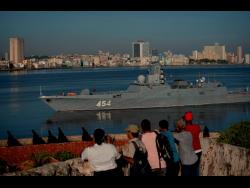Georgetown, Guyana, (CMC):
Guyana says there is agreement among regional partners that Russian warships due to sail to the Caribbean this month pose no security threat to the region, but has assured its citizens that it will not let its guard down.
Vice President Bharat Jagdeo, speaking at his weekly press conference on Thursday, said that while the presence of the warships may raise concerns about developing relations between Russia and Venezuela, he wanted to reassure the public that the presence of these vessels does not pose a direct threat to Guyana’s security.
Foreign Minister Jagdeo told reporters there was a consensus among some regional partners that Russian naval activities posed no immediate threat to Guyana or its interests.
“The view shared by some of our partners is that this is not something we should be concerned about, it is not a direct threat to Guyana or Guyanese interests, but we are vigilant and we have this issue firmly on our policy radar.”
International media reported that the Russian fleet will take part in naval exercises in countries allied with Moscow, specifically Cuba and Venezuela.
Jagdeo said President Irfaan Ali was actively negotiating with regional partners to address concerns arising from the situation.
In this context, fears of Venezuela taking tough action against Guyana loom large, particularly with regard to the Essequibo region, a disputed area that Venezuela claims as its own. Last month, Foreign Minister Jagdeo revealed that Guyana had notified relevant authorities of Venezuela's continuing acts of aggression, including the military buildup along the border.
On March 21 of this year, Venezuelan lawmakers, working with the government of President Nicolas Maduro, approved the creation of a new state in Essequibo, Guyana, despite the ongoing international court case.
The recognition is seen as consistent with President Maduro's assertion of his country's right to govern the 162,000-square-mile Essequibo region.
Guyana is currently taking legal action before the International Court of Justice (ICJ) on the substantive issues of the Guyana-Venezuela border dispute. Under the UN Charter and the Court's rules, the ICJ's final judgment on both jurisdiction and substance will be binding on both countries, regardless of whether Venezuela joins the proceedings.
Venezuela has so far participated in the International Court of Justice proceedings, despite claiming that it does not recognize the court.



